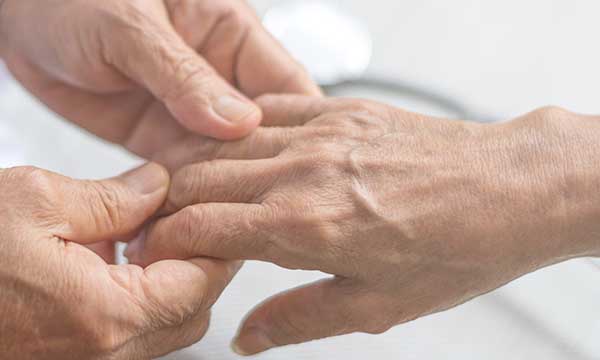Peripheral neuropathy is a condition that affects the nerves that exit and enters your body. These nerves control things like your movement, sensation, and ability to feel. There are different types of peripheral neuropathy, which can make it difficult to function normally.
The term comes from a combination of two words: NEURO which means -nerves - and PATHY- which means disorder, so it is a disorder of the nerves.
When the nerves affected are those beyond the brain and the spinal cord, the condition is called “peripheral neuropathy”
You could either have a dysregulation of the sensory fibers, the motor fibers, the autonomic, or all of them at once.
- Sensory nerves: receive sensation, such as temperature, pain, vibration, or touch, from the skin.
- Motor nerves: control muscle movement.
Autonomic nerves: Control functions such as blood pressure, perspiration, heart rate, digestion, and bladder function.
Types of peripheral neuropathy
There are many types of peripheral neuropathy, but the most common is Guillain-Barré syndrome (GBS), a condition in which the immune system attacks the nervous system. Other types of peripheral neuropathy include demyelinating polyneuropathy, mononeuropathy multiplex, and unilateral motor neuropathy. Each type has its own set of symptoms and requires its treatment.
To diagnose peripheral neuropathy, your doctor will ask about your symptoms and medical history. He or she may also perform a physical examination to look for signs of nerve damage. After making a diagnosis, your doctor will recommend treatment based on the type of peripheral neuropathy you have and the severity of your symptoms.
Treatment for chemotherapy induced peripheral neuropathy depends on the underlying cause and can range from supportive care to medication and surgery. Some people with GBS may require intensive supportive care to help them remain healthy while their immune system recovers. Other people with mononeuropathies may only need medication to control their symptoms. People with motor neuron diseases typically require long-term therapy that may include drugs, surgery, or both.
Causes of peripheral neuropathy
Do any of the above symptoms sound familiar to you? If answered yes the next question you should be asking yourself is what causes peripheral neuropathy in the first place and what I can do to make it better.
Peripheral Neuropathy may be caused by many different conditions, and sometimes you may have not only one but multiple causes, reason why it is so difficult to control.
Below we discuss some causes of peripheral neuropathy:
-Traumatic injuries or repetitive stress such as a job or a hobby that put continuous stress on the nerves for long periods, causing nerve irritation, inflammation, and subsequent nerve damage. For example, in certain sports such as golf, and tennis playing certain instruments such as violin, and viola put your nerves at risk of chronic inflammation, carpal tunnel is another good example of chronic nerve trauma.
- Infectious conditions such as chickenpox, shingles, human immunodeficiency virus (HIV), herpes, simplex, syphilis, Lyme disease, Epstein-Barr virus, and hepatitis C just to mention a few.
-Metabolic conditions such as diabetes mellitus and elevated uric acid.
Diabetic peripheral neuropathy requires special attention as it’s by far the most common cause of peripheral neuropathy. It is estimated that around 60% of diabetic patients suffer from a form of peripheral neuropathy, being PN the number one cause of non-traumatic lower extremity amputations in the US.
Symptoms of peripheral neuropathy
Common symptoms of peripheral neuropathy include sensory origins such as burning, shooting, electric shock-type sensations, pins and needles, numbness, and tingling sensation that comes and goes.
The dysregulation could be so severe that sometimes these nerve branches are damaged to the point that even a normal touch could be felt as pain, a condition called Allodynia, or in other instances a minor pain stimulus for example gentle pressure with a toothpick may be felt as a severe shooting pain similar of what you could have felt if you cut yourself with a knife, a condition called hyperalgesia, basically is an exaggerated pain response.
Other presentations include loss of sensation, loss of balance and coordination, muscle weakness or paralysis if the motor fibers are affected and if the autonomic fibers are affected you will notice trouble with excessive sweating, digestive issues, low blood pressure, with associated dizziness and lightheaded just to mention a few.
How to treat peripheral neuropathy symptoms
Peripheral neuropathy is a condition that affects the nerves that supply the body with feeling and movement. Symptoms can include burning pain, numbness, tingling, and difficulty walking. There is no one-size-fits-all approach to treating peripheral neuropathy, but there are some common treatments that may help relieve symptoms.
Some tips for relieving peripheral neuropathy symptoms include:
• Taking over-the-counter painkillers or ibuprofen as needed to control pain.
• Resting your arm and leg as much as possible to reduce inflammation and discomfort.
• Wearing an elastic bandage or compression stocking to help reduce swelling and improve circulation.
• Using a heating pad or ice pack on specific areas of pain if available.
Conclusion
Symptoms of peripheral neuropathy can vary and can include tingling, numbness, pain, and difficulty with movement. If you are experiencing any of these symptoms, it is important to seek medical attention as soon as possible. There are many treatments available for peripheral neuropathy, and the sooner you get help the better your chances of recovering Fully. We hope that this article has helped you understand what to look for to diagnose and treat peripheral neuropathy. If you have any questions or concerns, don’t hesitate to contact us at our toll-free number or chat online with one of our expert advisors today!


No comments yet